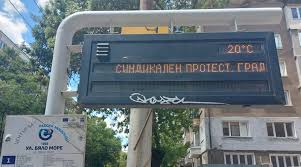Deal set to end public transport strike in Bulgaria’s capital

Sofia: Leaders of trade unions involved in the public transport strike in Bulgaria’s capital city Sofia said on May 19 that normal service would resume on May 20, the result of intervention by GERB leader Boiko Borissov announcing that the government would provide 15 million leva from the state budget to increase the salaries of public transport employees.
The strike, which entered its sixth day on May 19, has involved trams, trolleybuses and buses staying in their depots, while the metro underground railways has continued operating throughout.
Borissov, who throughout has used the strike to criticise Sofia mayor Vassil Terziev of the rival We Continue the Change – Democratic Bulgaria (WCC-DB) coalition, cast himself in the role of saviour in a crisis that WCC-DB has insisted that GERB fomented in the first place.
Flanked by Prime Minister Rossen Zhelyazkov and Finance Minister Temenuzhka Petkova, both from his party in the national coalition government, Borissov met representatives of the trade unions and city councillors from GERB and the Bulgarian Socialist Party, calling for a solution to the public transport crisis that has left large numbers of Sofia residents scrambling to find alternatives to travel in the city, and going on in a live stream on Facebook to announce the state’s financial intervention.
Georgi Panayatov, head of the transport sector in Sofia in the Podkrepa trade union federation, told reporters that motor vehicle public transport in the city would resume on May 20, while the union would continue to advocate for higher pay.
The trade unions had demanded additional 400 leva monthly salaries this year, escalating in coming years. The government intervention announced by Borissov and the trade unions, in the form of a transfer to the Sofia municipality, enables an increase of 300 leva a month.
According to Borissov, whose meeting with Zhelyazkov, Petkova and the unionists was held at his GERB party headquarters and not at the Cabinet office – though officially it was Zhelyazkov who called the meeting – the government was forced to intervene, as were the political parties from the national ruling coalition, because Terziev “clearly cannot or does not want to deal with the situation.”
“The mayor wants to pretend to be stronger than everyone. He is very skillful in shifting the blame. It is clear that he cannot solve the problems,” Borissov said.
Terziev, whose handling of the crisis included conditional calls for talks and a statement at the weekend that he would not negotiate with those who were holding the city hostage, had insisted throughout on pointing to the significant pay increases already given in recent years to public transport employees.
Ivan Kirilov, head of the Federation of Transport Workers in Podkrepa, told Bulgarian National Radio on May 19 that at 7pm, “we will issue an official decision to end the blockade of public transport in Sofia”.
Ivan Takov of the Bulgarian Socialist Party and head of the transport committee at Sofia city council, said: “Since the administration of mayor Vassil Terziev is unable to solve the problem of the crisis in public transport, the Sofia municipal council will do so”.
Kiril Petkov, co-leader of WCC-DB which is in opposition to the GERB-UDF-government at national level, said that Borissov was putting on a show by allocating additional funds for public transport in Sofia to stop the protests.
“Come on, there’s no need for another Borissov theatre. The whole problem could have been solved when the state budget was being adopted,” Petkov said.
WCC-DB supporters have seen the public transport protest as fomented by Borissov’s GERB as a means of discrediting Terziev, putting it in the context of other GERB-backed moves against WCC-DB figures at municipal level. On the evening of May 29, there was a protest outside Sofia municipal headquarters in solidarity with Terziev.
Ahead of that event, Terziev said: “We have witnessed another episode in the same series – creating a problem, solving a problem by the same people and solving it in a not very long-term, not very well-considered way.
“What is omitted to be said, besides the whole circus performance, is what problem exactly would these 15 million solve for us and these 15 million come today, quickly, to solve a problem, but they do not say that the municipality must also next year find every single lev that is voted for an increase,” he said.
Sofia deputy mayor in charge of finance Ivan Vassilev said in a Facebook post: “Once again, Borissov is giving away our common money without any arguments or looking for sustainable solutions. He continues to look for ways to buy the people’s love, and we pay for it”.
“I call on the government to take a serious and responsible approach to the state’s finances and taxpayers’ money. We have repeatedly stated that pouring money ‘into the wind’ on everyone is not a realistic solution, neither today, nor next year, nor the year after that,” Vassilev said.
“The systemic problems of transport in Sofia will not be solved with 15 million, or 50 million, or even 100 million, if there is no reform in the companies managed by the municipal council and the GERB – BSP – ITN dark majority,” Vassilev said, referring to the national coalition government.





